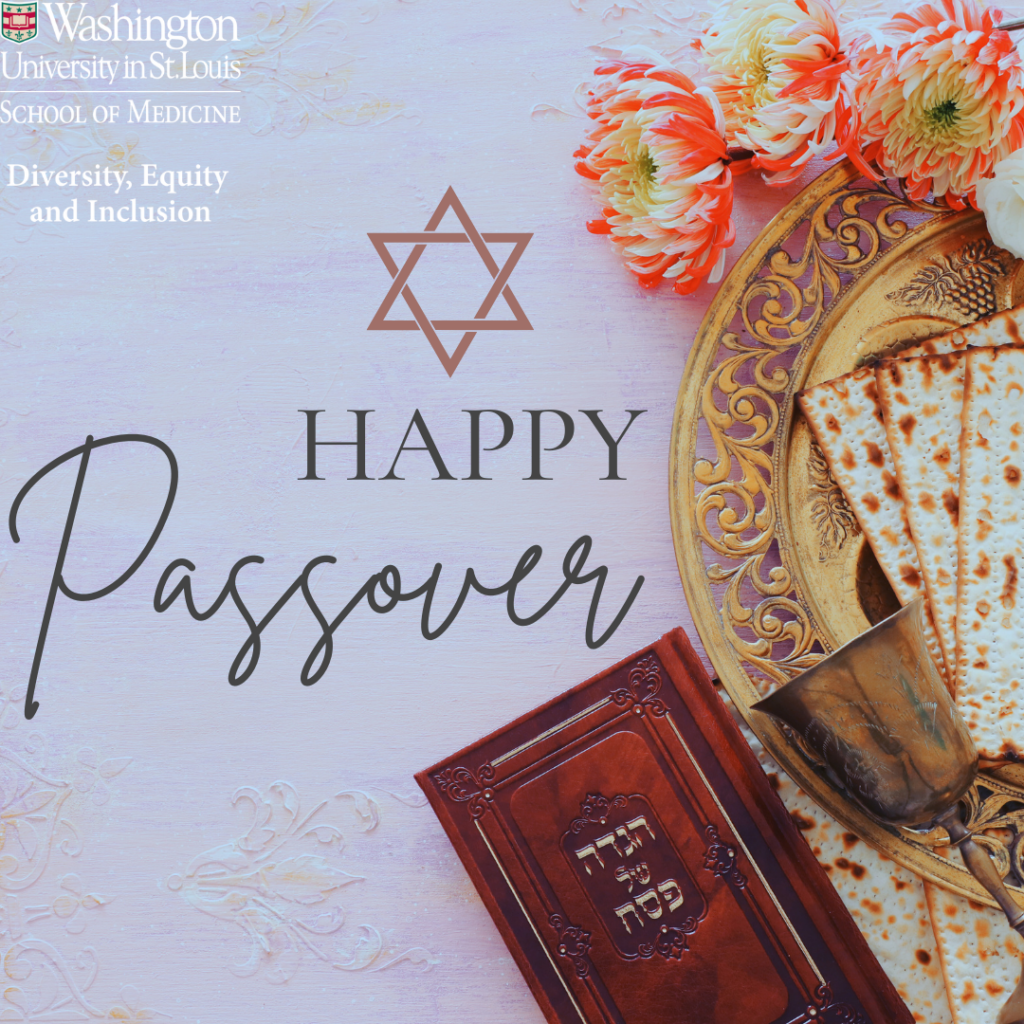
PASSOVER BEGINS TONIGHT: HERE’S WHAT YOU NEED TO KNOW!
Tonight marks the first night of Passover 2023, and many across the WashUMed community will sit down to a seder, a ritual meal traditionally held on the first two nights of the eight-day Jewish holiday.
What is Passover?
Passover, or Pesach in Hebrew, is one of the Jewish religion’s most sacred and widely observed holidays. In Judaism, Passover commemorates the story of the Israelites’ departure from ancient Egypt, which appears in the Hebrew Bible’s books of Exodus, Numbers and Deuteronomy, among other texts. Jews observe the weeklong festival with a number of important rituals, including a traditional Passover meal known as a seder, the removal of leavened products from their home, the substitution of matzo for bread and the retelling of the exodus tale.
– Festival of Freedom *Begins sundown on April 5, food restrictions all days, work restrictions 4/5 sundown – 4/7 sundown and 4/11 sundown – 4/13 sundown
How long is Passover?
Passover lasts seven to eight days, “depending on family and communal custom,” according to the Union for Reform Judaism. In 2023, the holiday runs from the evening of April 5 to the evening of April 13. On the first two days and the last two days of Pesach, no work is permitted. During the middle four days, work is permitted.
Passover Greetings
There are a few sayings you can use to wish someone a happy Passover. “Chag Pesach sameach,” which means “Happy Passover,” or “Chag Sameach,” which means “Happy holiday,” are two of the most common greetings to use. “Chag kasher v’sameach,” which means “Happy and kosher holiday,” is another appropriate greeting.
Resources:
-Common Practices and Celebrations
- Family and friends gather for Seders.
- At Seders people often discuss past and current injustices in their country of residence and elsewhere in the world.
- Avoid scheduling important academic deadlines, events or activities.
-Common Dietary Restrictions
- No leavened or fermented food are eaten. Additionally, some observers of Judaism follow kosher rules of eating.
- Meat and dairy are not eaten together.
- Pork and seafood are not eaten.
- Food accommodations should be made for events. Besides Kosher restrictions, the use of leavening is prohibited; matzah is eaten in place of bread.
Tips on supporting the WUSM Community
-WashU Religious-Holiday-Class-Absence-Policy
Ask community members in observance how they celebrate and how they can be supported and encouraged!
- Professors and instructors: When planning tests, field trips, or other major events in your classroom, use the calendar to prepare for impacts to your class on a day that students may take off due to an observance.
- Avoid scheduling important academic deadlines, events, or activities during the first two and last two days of these Holy Days.
- Students: When recognizing an academic requirement may land on a date of observance for you, make time to communicate with your instructor well in advance to find a way to work with your academics and your beliefs.
- While students are not automatically excused from class for this observance, they may work with their course instructors to make accommodations. Graduate and professional students must refer to their own school and departmental vacation policies and calendars for more specific information.
- Employees: Utilize this calendar when planning a training, retreat or social event to consider when staff may be taking time off for religious accommodations.
- Expect that observers will not attend meetings or communicate during the first two and last two days of these Holy Days.
- Staff members may request paid time off for this observance. Support their preference to take leave for their religious observance.
-Follow the WashU Chabad on Instagram for upcoming events & holidays, student spotlights, and amazing opportunities to become involved in our very own WashJew community!
–JGrads & Young Adults: JGrads is dedicated to serving Jewish graduate students, professional students and recent college graduates living in the St. Louis area. We build community through social programming, career networking, cultural celebrations, and Jewish learning. Some of our past events have included: happy hours, paint nights, speakers, campus lunch ‘n’ learns, etc.
-Download a copy of WashU Hillel’s Community Passover cookbook by clicking here!
–WashU Hillel carries on long-standing Passover meal tradition
-Visit: Office for Religious, Spiritual and Ethical Life
-WashU Spaces for Prayer and Reflection